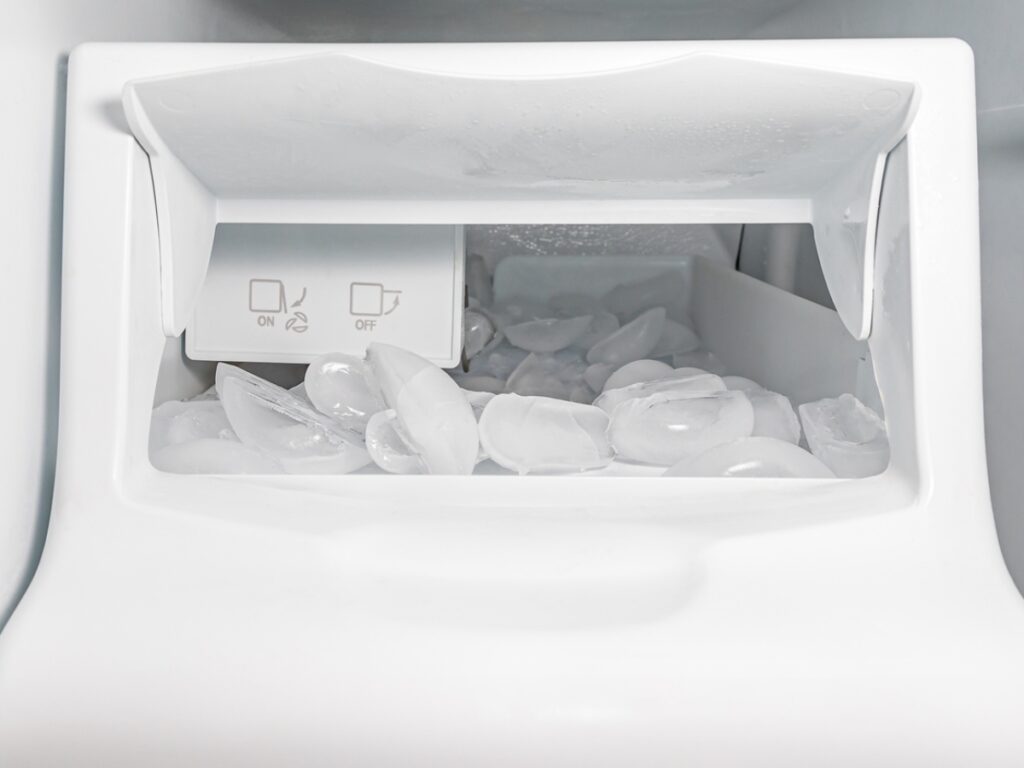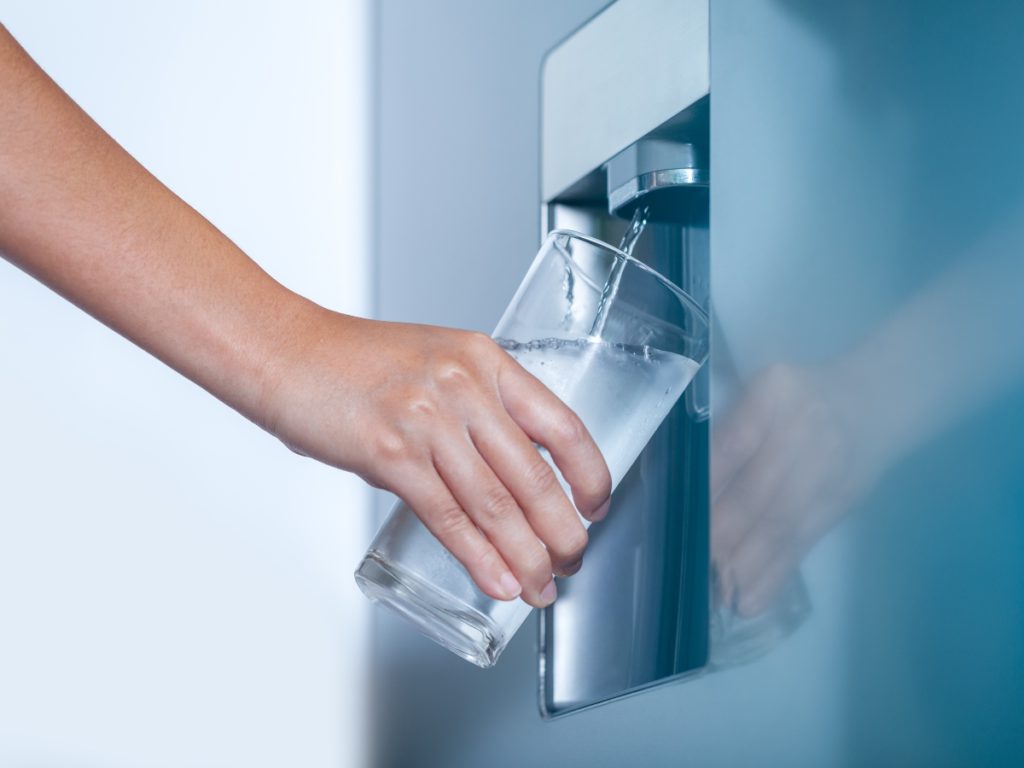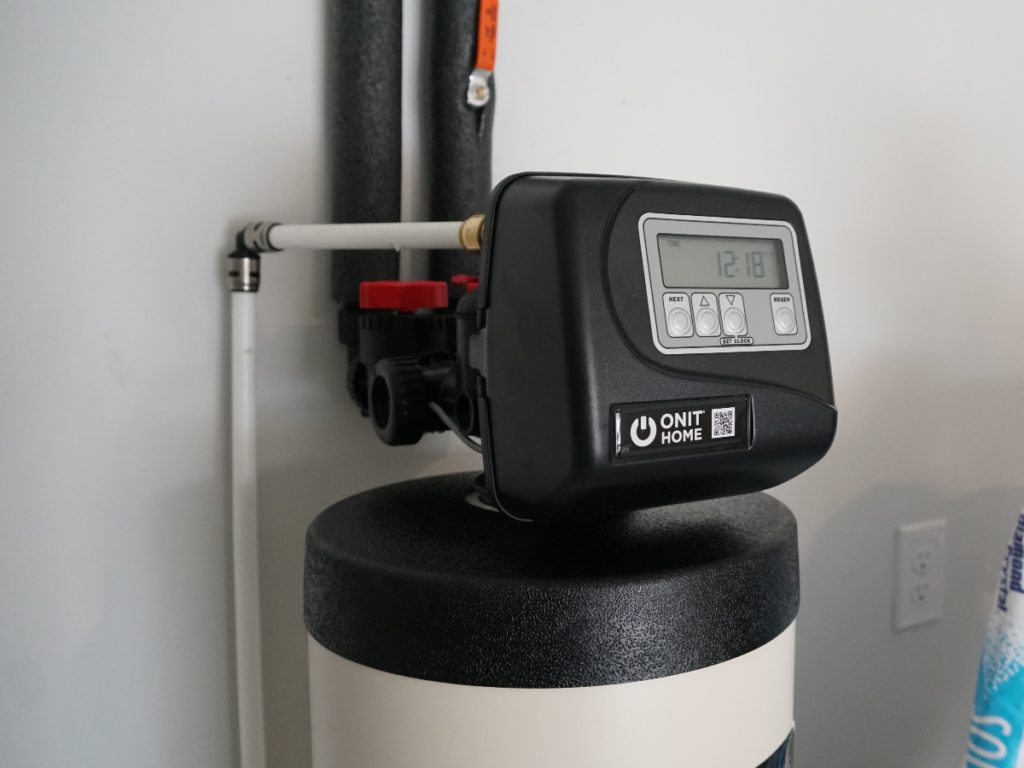A refrigerator is a crucial kitchen appliance for any household. It has transformed from a traditional role of preserving perishables to modern features such as water and ice dispensers. If you’ve recently bought a fridge with an ice maker, you may wonder, “Does a refrigerator ice maker use filtered water?”
In a nutshell, it all depends on the model of your refrigerator. Most modern fridges have built-in water filtration systems to filter contaminants before the water reaches the water and ice dispensers.
This article will examine whether refrigerator ice makers use filtered water and why you’d want ice made from filtered water. We also give you tips on when you should empty an ice machine.
Does a Refrigerator Ice Maker Use Filtered Water?
Whether a refrigerator ice maker uses filtered water depends on the model of the refrigerator. Most modern fridges already have a water filtration system to filter the water before it reaches the ice maker and dispenser. A filtered water supply for your ice maker ensures you get contaminant-free, aesthetically pleasing, and better-tasting ice.
Refrigerators may come with separate ice makers and water dispenser filters, depending on the model. Some fridges may come with a fridge filter designed to filter both the water for the ice maker and the water dispenser.
It’s worth noting that not all refrigerators that have ice makers come with an in-built filter. So it’s worth checking before buying a refrigerator if you want your ice from filtered water. If you already have a fridge that you bought recently and you’re wondering if it has an ice maker filter, here are a few ways to check:
- Check your refrigerator’s owner’s manual. It usually indicates whether the ice maker uses a water filtration system.
- Look inside the refrigerator to see if you can locate the filter. The exact location depends on the model and brand. However, many manufacturers place the water filter inside the refrigerator at the top. If you can’t see the filter inside the fridge, check it at the back near the water supply line.
- The kick plate at the bottom of the fridge is another place to check for the filter.
- Contact the manufacturer or dealer to confirm if there’s no sign of a water filter in your refrigerator.

Reasons for Using Filtered Water for Your Ice Maker
We all know how a refrigerator ice maker makes our life easier, from cooling us down to beauty regimes. But do you know why using filtered water for your ice is essential? Let’s explain why you’d want your ice to come from filtered water.
Improve the Taste of Your Ice
Have you noticed your ice cubes have a weird flavor or smell that doesn’t sit right with you? That could be from the impurities in your unfiltered water. Whether it’s tap or well water, some contaminants affect the taste and smell of your water, which is transferred to your ice cubes. Mostly, this happens if the ice maker uses water that is not filtered. Using filtered water for your ice can reduce the impurities, leaving you with cleaner and better-tasting ice.
Better Ice Clarity
Are you wondering why your ice looks less appetizing and visually pleasing? It could be from the cloudiness, sediments, or rust in your unfiltered water. Using filtered water eliminates these impurities, leaving you with crystal-clear ice cubes.
Prevents Health Issues
Are you aware the Environmental Protection Agency (EPA) has set standards for over 80 drinking water contaminants that may affect our health? Using unfiltered water for your ice cream exposes you and your loved ones to many harmful contaminants. When your ice maker uses filtered water, you eliminate contaminants from getting into the ice, resulting in a safer and healthier option.
Extend the Lifespan of Your Appliance
Unfiltered water may contain hard water minerals, which, over time, can build up on your refrigerator ice maker. This buildup eventually clogs the machine, especially if it’s not cleaned regularly, leading to decreased performance or malfunctions.
When you use filtered water for your ice, you keep your ice maker on tip-toe performance and reduce the frequency of maintenance. You also extend the lifespan of your refrigerator ice maker.
What Happens if My Refrigerator Does Not Have a Water Filter for the Ice Maker?
If your refrigerator does not have a water filtration system, it means your ice is from unfiltered water. However, you don’t have to worry since you can quickly fix this by installing an external water filter. This means installing an inline filter on the water supply tube at the back of your refrigerator.
You can easily DIY the filter; however, if it’s a daunting task for you to handle, you can call in a professional to help you.
It’s good to note that there’s no need for an inline water filter if you already have a whole water filtration system. That’s because the system ensures clean water, even the ice maker, in your home!
When to Empty Your Refrigerator Ice Machine
The time to empty your ice maker may depend on individual circumstances, usage, and preferences. However, here are a few tips on when you can empty your ice maker machine to maintain optimal performance and quality of the ice.
Tip #1: When You Notice Signs of Ice Buildup or Blockage
Some factors, such as improper usage or poor maintenance, can lead to ice buildup in the machine. Inspecting, emptying, and cleaning your ice maker is crucial to avoiding ice blockages.
Tip #2: Before an Extended Period of Non-Use
Remember to empty your ice maker if you plan to be away from home for an extended period. This prevents ice or water from sitting in the bin for too long. It also ensures you’ll still have quality ice cubes upon resuming regular usage.
Tip #3 During Regular Cleaning
We recommend emptying and cleaning your ice maker at least once every month or two. Cleaning helps prevent the buildup of minerals, mold, or bacteria. As a result, you’ll keep your machine at peak performance and get quality ice cubes.
Tip #4: There’s a Change in Ice Quality
If you notice a decrease in your ice’s quality, such as taste, size, and color, it’s time to empty and clean the machine. Note that cold surfaces are easily susceptible to smells, meaning your ice can get an odor from food installed in the refrigerator.
Furthermore, as your fridge’s water filter ages, it reduces its ability to filter water effectively. That’s why changing your water filter based on your manufacturer’s recommendations is crucial. Most companies advise changing the water filter every six months.

Importance of a Whole Home Water Filtration System in Your Home
If your refrigerator has a water filter, you might not see the importance of a water filtration system in your home. However, having a water filtration system is a vital investment in any home. It’s good to note that fridge filters use carbon filtration technology, which is most effective at removing contaminants that affect the water’s aesthetics, such as taste and smell. A fridge filter cannot remove bacteria, viruses, among other contaminants.
With that said, if your fridge does not have a water dispenser, you will use water from your tap or bottled water for drinking. Or let’s say you have a water pitcher; still, you will need clean water for cooking and other uses such as laundry, especially if you have hard water.
These alternative methods will be expensive in the long run. A whole home water filtration system ensures clean water from every tap. You’ll enjoy everything from better-tasting ice cubes to clean drinking water, laundry water that lathers well, and everything in between. A whole-home water filtration system is the best to achieve all these. However, you can choose other water filtration systems, such as reverse osmosis, ion exchange, and ultraviolet (UV) filtration systems, among others.
While these systems are effective at removing the contaminants they are designed for, there are contaminants they cannot remove. That’s where whole-home water filtration comes in. It helps remove 99.99% of water contaminants. Most home water filtration systems combine filtration technology, allowing for multi-stage filtration and making them more effective.
Frequently Asked Questions (FAQs)
Here are some frequently asked questions about whether ice uses filtered water.
Do all refrigerator ice makers use filtered water?
No. Not all fridge ice makers use filtered water; it depends on the brand and model of the refrigerator. Some come with in-built filters, while others don’t.
How can I tell if my refrigerator uses filtered water?
You can check the refrigerator’s manual or look for indications of an installed filter inside the fridge, at the back, or in the kick plate. Further, you can contact the manufacturer for clarification.
Is it necessary to use filtered water for my ice maker?
While using filtered water for your ice is not strictly necessary, there are many reasons to use it. You’ll enhance your ice cubes’ taste, appearance, and smell. This leads to better enjoyment of your drink or food. It also eliminates some contaminants from your ice, making it a safer choice.

Enjoy Better-Tasting, Safer, and Crystal-Clear Ice From Your Ice Maker
So does a refrigerator ice maker use filtered water? Not all ice makers use filtered water to make ice. Furthermore, not all fridges with ice makers come with fridge filters; it depends on the specific model. However, most modern refrigerators come with an in-built filter to ensure you get the best ice quality from your machine. If you have a refrigerator ice maker without a filter and have not installed a filtration system, ONIT Home is here.
Our home water filtration system can improve your ice quality, keep your family safe and extend your ice maker’s lifespan. Besides improving the quality of your ice, you will also get clean and safer water from every source in your home. Call us at 1-833-433-0331 for more information from our professionals. Need filtered water? We’re ONIT!



